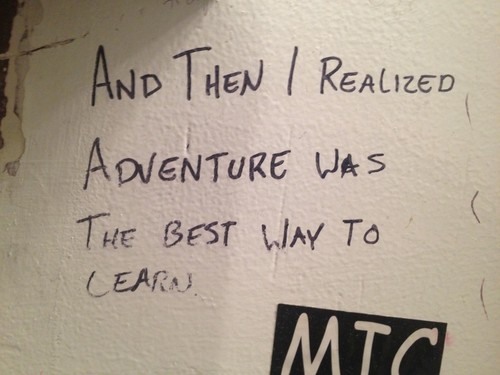
This year marked the fifteenth (gak!) in my career in education, so it’s nice that I still have the opportunity to reflect upon firsts. As time passes, many of us transition into new and exciting roles, and the 13-14 school year was one of those for me.
I accepted the position of elementary instructional technology integrator for our district after my son was born last school year. I had no desire to attempt to balance the demands of new motherhood with the likely-more-insane-and-less-fun demands of being an elementary principal, so I resigned at the end of my maternity leave. (People often ask me if I miss administration. That is a terribly phrased question. I do not miss administration. Do I miss being the principal? Every now and then. I miss kid time and -some- decision-making authority.)
My current role is to support the teachers and students of three elementary schools in our district. I have a “base” in each of the three schools, and spend my work days each week traveling to the three buildings. I commute a decent distance so I will say one of the lows of this position is all of the driving that is involved. I dislike commuting immensely, so I need to devise a plan to make that time more worthwhile. Perhaps a Voxer podcast? 🙂 I also end up schlepping around my belongings from place to place, thus my cart and I have become intimately acquainted this year. (And for the record, I really need one of these. Cords are pesky.)
To guide my reflections on this year, I’m using some questions shared by Elena Aguilar in her collection of coaching tools (also check out her post, Reflecting on a Year of Learning for more great tips on the reflection process). I uploaded her Questions for reflecting on a year of learning document here in Google Drive for you to access. It’s available in Word in her post.
My reflections go a little something like this.
This Year
This year I crafted the role of the elementary tech integrator kind of from scratch, as it did not previously exist in our district, although my job description mirrored that of our secondary tech integrator. I spent time getting to know the teachers and students at each building. I made sure certain online accounts were up and running, such as those for Kidblog and Qwertytown. I devoted a good deal of time to curating and sharing resources. I used Google Forms for record keeping purposes, to easily track the grade levels, teachers, students and teams I worked with, as well as the different topics and tools that I coached/provided tutorials and/or direct instruction. My summary of responses indicated that I spent a lot of time working with grades 3-6 and less time in the primary grades. Reflecting on that, our Grades 4-6 students learn in a 1:1 setting and therefore have more opportunities for fluent tech use on a daily basis, where the primary classes typically share devices and/or utilize the computer labs for project work. Google Apps for Ed accounts begin in grade 3, and I completed numerous lessons and push-in support for students and teachers on GAFE topics this year. I worked 1:1 with a number of teachers, supporting their classroom endeavors, and also with specific grade levels supporting needs as requested. I had the opportunity to push into a grade five classroom during their Genius Hour project work time for a handful of hours, and the students really inspired me with their questions, thinking, and project work! Also this year I finalized the K-6 technology integration framework that is built on ISTE Standards for Students, and I worked with the secondary tech integrator, the mighty Tim, to write Spartan Digital Competencies for Teachers based on ISTE Standards for Teachers. This will be used in conjunction with our teacher evaluation system to provide teachers with the opportunity to set goals and make plans to integrate technology meaningfully into their practice and classroom activities. I worked through the Common Sense Media scope and sequence and instructed students in grades 3-6 on various lessons from that framework, and also met with our computer lab personnel to help them roll out these lessons in their settings as well. Throughout the year I developed and presented sessions during our elementary in-service days. We learned more about blogging with students, incorporating Google Drive into classroom activities, digital storytelling projects, and formative assessment with digital tools. Tim and I co-planned the end of year “Tech Day” for all K-12 staff, which was held on the last day of school. We received some really positive feedback about the structure of the day and the sessions offered! I also ended up assuming the role of overseeing some of the district’s social media channels.
I’d like to think I made a positive impact this first year. I noticed an increase in use of many of the digital tools our district offers, and I received some complimentary feedback on a personal level from a number of teachers. That being said, I didn’t reach as many people as I could have. I didn’t “push” enough and perhaps didn’t make myself as available as possible. My hope is that now that my position is well established, folks will think of me sooner than later next year, and eagerly ask for my input and help when needed. What I learned about adult learners is that they want relevant, timely resources. They want to be coached in a way that does not belittle them or make them feel as though the skills they already have are not important. Teachers will not plan to use technology/devices/tools that are unreliable. There is nothing more defeating than getting psyched up to take a risk and try something new in your classroom, and then have a huge fail: device fail, network fail, battery fail, whatever. What I learned about students is that they want to talk about their digital interactions and their lives using technology. Even our youngest learners are using technology in ways that can be powerful, yet many are subscribed to services and using apps and platforms that are collecting their data and using their personally identifiable information, and they’re doing so without a parent’s permission or without some adult in their life looking over their activities. That makes me nervous and further solidifies to me that we, as educators, need to model for our students what it means to be a critical, wise, healthy, and kind consumer and creator in the digital age.
As I spent a lot of time locating, curating, and sharing resources for my teachers and school community, I can share evidence such as my Elementary Tech Integrator blog, Tech Tidbits issues made on Smore, and family newsletters. I also created instructional materials to accompany the Common Sense Media digital citizenship lessons we taught in grades 3-6 and became a Common Sense Media Certified Educator this year. I presented with some of our district support staff at a Title 1 parent conference at our IU to share family-focused digital citizenship resources.
In the connected edusphere, I had the opportunity to write a chapter for an upcoming Learning Forward publication, presented at FETC, PETE & C, and several webinars for Simple K-12. I facilitated another successful Educational Leadership in the Digital Age course for PLP (hoping to run another section in the fall, if you’re interested!) and next year I am slated to attend and present at Edscape, the Learning Forward conference, and integratED PDX.
This Summer
Truthbomb: this summer I am going to spend a lot of time with my ridiculously handsome and personable toddler and family and a lot of time at the beach! My position is a teacher contracted position and thus I am no longer a 12-month employee. I am scheduled to work a handful of days in the summer months, which will include
- Attending IU13’s e-Learning Revolution conference next week, presenting on digital age professional development on day 2 and the Bucks-Lehigh Edusummit in August to share about elem. tech integration
- Providing a day of training for staff with our new district blogs through Edublogs/Campuspress!
- Continuing to update the Elem Tech Integrator blog and sharing resources with staff
- Working with our grades 1 and 6 teams who are transitioning to a hybrid instructional model next year
- Reading Invent to Learn and putting some ideas together for an elementary makerspace
- Continuing to moderate the Instructional Technology Integrators and Coaches Google+ community
- Capturing family moments in thousands of photos and videos, using Day One to journal our special time together, and working on my Project Life 2014 album
No matter what your role this year, take some time to reflect. You’ll be surprised at how this process allows you to see how much you’ve learned, the ways in which you contributed to your learning community, and the things you need to do to improve and grow professionally to make an even more lasting impact in years to come. This post is certainly worthy of a TLDR tag, and I know I didn’t articulate all of the ways in which I served my district this year, but this reflective process is truly a powerful one.
In my next post, I’ll tackle the final two sections of Aguilar’s reflection guide: what I hope to accomplish come August/Fall and Next School Year. Stay tuned!

I was thinking about a post on my own firts year as principal…I hope to find the time to write it as I am a 12 months (and nearly 24/7) employee now. But reading your post made me realize how important reflection is for each of us and I find you inspiring as always. Greetings from Italy 😉
Greeting, Silvia! I know the life of a principal is 24/7 and the opportunities for reflection seem fleeting at best, but I do hope you will take some time to share with us your first year experiences! So many would learn from you. Check out Elena’s coaching tools for some great reflective prompts. They really helped me think through what I wanted to say. Have you decided on which conference to attend in the coming year?
great post! Seems like you have had a good year. They are lucky to have you as a tech supporter for teachers. We have similar positions in Norway but for a lot more schools. My experience is that schools do not ask for help much. They probably don’t know what to ask for. I will take your advice and reflect on my own year as administrator and teacher and then make plans for how I can improve next year! Have a great summer with your family!
Wonderful to hear from you, Ann! I agree that some teachers and even administrators do not feel comfortable asking for help. I am sure the reasons why vary by individual, but in our learning communities where we hopefully encourage students to think through problems and work collaboratively with others to achieve, I’d hope that teachers and admin feel comfortable admitting “I don’t know this!” and reaching out to others for support. Hope all is well with you, Ann, thanks for commenting!
Lyn,
I appreciate your reflection. I have been hoping to hear how your first year went. It sounds like it was productive. I have been working on several similar projects this year and will be working on a post this week to summarize what I have been up to. I am looking forward to poking around your site a lot more this week. You put many great links and resources on the page.
Ann
Ann, thanks so much for commenting! I look forward to reading your post and learning more about your projects. We are transitioning to a new site host in the coming weeks, so if you encounter any hiccups with my resource site, I apologize! Keep in touch!